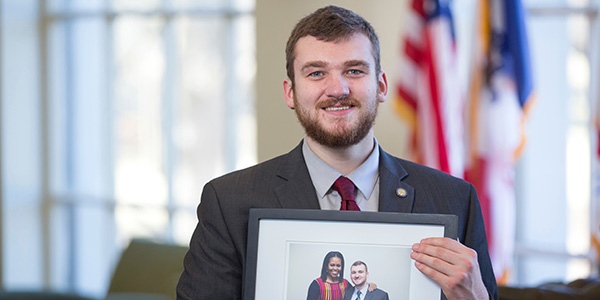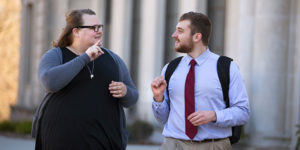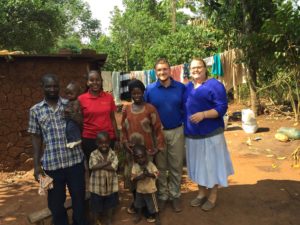
Five Questions with White House Intern Dakota Olson
Dakota Olson is fresh off the internship of a lifetime. Olson was part of Michelle Obama’s personal communications team in the White House last fall. The junior double majoring in global resource systems and agriculture and society from Keswick, Iowa, was one of more than 10,000 applicants for 15 internships available in the White House.
To many, it may appear Olson has had more than one “internship of a lifetime” while at Iowa State. As part of the college’s Center for Sustainable Rural Livelihoods, he’s worked alongside Ugandan college students to develop and deliver curriculum and manage sustainable compost pits for rural primary schools. He speaks Spanish and is fluent in Advanced American Sign Language (Olson is Deaf with a cochlear implant). His language skills have proved key in navigating agricultural learning experiences in Haiti, Mexico, Spain and Holland.
Olson reflects on his experiences in the White House and how they may shape his future.
Was your experience in the White House what you expected?

Kody Olson, left, who served as a communications intern for First Lady Michelle Obama, walks campus with his sign language assistant, Megan Johnson. (Christopher Gannon/Iowa State University)
Most people, when they think about an internship at the White House, can’t help but envision daily fist-bumps with the president, browsing memes on the internet with the vice president, gardening with the first lady and giving some clever advice to the press secretary. A lot of the experience just isn’t that glamorous. You’ve got to do what is expected of most interns in any office—copy papers, clear a jammed printer, stuff envelopes and do a lot of reading. In fact, one of the first pieces of advice I got was to just “keep your head down and get your work done.” An office can’t function if interns are spending half of the workday lingering outside of the Oval Office hoping to see the president.
It’s all worth it when you get to attend weekly speaker series with White House senior staff and ask them anything you want or attend staff holiday parties and rub shoulders with some incredible people or even stand out on the South Lawn and greet the president and first lady as Marine One lands.
What obstacles did you have to overcome to be a successful intern?
In order to build up a resume to be prepared for such a prestigious opportunity I had to constantly be outside of my comfort zone and face adversity head-on. The biggest barrier that I face is that I am Deaf with a cochlear implant. All my life I have been placed in environments that just aren’t designed for people like me. I’ve traveled to countries in the Global South (the collective term for nations of Africa, Central and Latin America and most of Asia) without American Sign Language interpreters and been in work environments that pushed me to my limit and caused me to redefine my barriers. These experiences forced me to advocate not only for my needs, but those of others as well in order to level the playing field and provide equal opportunities for people with disabilities.
The White House was a different story, however. I found it to be an incredible and inclusive atmosphere providing equal opportunities for people with disabilities and of various races, ethnicities, religions and other minority factors. I found the White House work environment to be built with an inclusive design in mind— videos were already captioned, sign language interpreters were provided and any accommodations I needed could easily be requested.
Within the first few weeks, I connected with the West Wing receptionist (known by ROTUS, or Receptionist Of The United States, to many) who is Deaf. Leah Katz-Hernandez is a true barrier-breaker as a Deaf, Latina woman working in the most prestigious office in the world in one of the most front-facing positions. She was an excellent mentor and role model for me, providing me with valuable insight and advice on being a Deaf person working in the White House and how to succeed.
As far as making this experience work for me, I am so incredibly grateful to have the strong and unwavering support of my parents and family, Iowa State University, the College of Agriculture and Life Sciences, my professors and faculty and incredible folks in D.C.
How does an intern manage the first lady’s correspondence?

Megan Johnson, American Sign Language interpreter, works with Kody Olson in a number of classes on campus and accompanied him to Uganda as he participated in the college’s Center for Sustainable Rural Livelihoods internship program. (Contributed Image
Our role was less about correspondence, but more about managing how the first lady interacted with the American public and global leaders.
As you can imagine, the first lady received thousands upon thousands of letters, gifts, emails and other forms of communication.
Three other interns and I managed correspondence for the Office of the First Lady, as well as my supervisor and the director. We had a group of 24 outstanding volunteers who read each item of the first lady’s mail and appropriately processed it. We might send a dozen autographed photos to a classroom or send a letter of encouragement from the first lady to constituents in need. We sent a lot of birthday greetings and thank you notes.
What was the most exciting or rewarding experience?
By far the most rewarding part of my job was being able to help those in dire need. We had access to every federal agency through our liaisons and were able to assist those seeking assistance. I was able to help military veterans get medical care from the Veteran’s Administration, find people somewhere to live through the Department of Housing and Urban Development, get people healthcare solutions from health and human services and help people fight injustices and discrimination with the power of the Department of Justice.
How will this experience help you meet your future goals?
Having “White House” on your resume is a pretty strong point! I crafted skills that will be relevant in any career path including leadership and team development, office management and internal and public communications.
In a broader view, I learned so much about public service and influencing positive change in our society. I participated in workshops led by public speaking experts, presidential speechwriters and government experts to learn how to engage and organize communities.
Above all, I want to continue to develop my skills and apply them to whatever future career I choose. Right now I’m focusing on my work with the MEANS Database—an online platform I lead that connects emergency food donations with local organizations in need. If I learned anything about my future, it was discovering my North Star—what it is that guides me. For me, it’s serving others and making people’s lives better.



